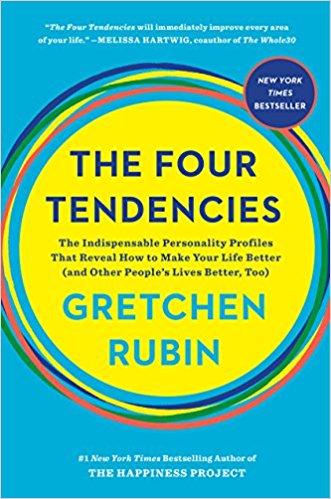The Four Tendencies Summary
3 min read ⌚
 The Indispensable Personality Profiles That Reveal How to Make Your Life Better (and Other People’s Lives Better, Too)
The Indispensable Personality Profiles That Reveal How to Make Your Life Better (and Other People’s Lives Better, Too)
People fit in one of “The Four Tendencies”. Which one are you?
About Gretchen Rubin
 Gretchen Rubin is a bestselling author that has helped millions of people around the world to get a better understanding of themselves and create happier lives.
Gretchen Rubin is a bestselling author that has helped millions of people around the world to get a better understanding of themselves and create happier lives.
“The Four Tendencies Summary”
How do you react to expectations?
We know that might seem like a question that does not bring much insight, but if we dive deep enough into its nature, we can gain tremendous knowledge.
Exploring your responses to expectations will not only give you a more in-depth look at your own character but will also increase your understanding of the people that surround you.
In reality, there are four tendencies that people have when it comes to responding to expectations. They are connected to the way people react to external expectations, which are set from our society, and to our inner expectations which we create ourselves.
According to the tendency which is the most visible in people’s behaviour, they feet the following categories: upholders, questioners, obligers and rebels.
Understanding these categories and the tendencies can help us tremendously in our relationship with others, as well as with our own productivity and efficiency.
Let’s begin with the Upholders.
Upholders succeed meeting both types of expectations: the inner and the outer ones.
At first glance, this may seem like the ideal category to belong in, since they respond well to both kinds of expectations and as a result are very productive and reliable.
However, the upholder tendency comes with its challenges.
Since upholders love following rules, at times they may do so blindly, and end up following directions which are harmful and wrong. Also, they are very difficult when it comes to embracing change.
The second type of people is the Questioners, who are people who successfully meet inner expectations but struggle with outer expectations.
The questioners will not follow orders just because they came from a boss or just because something has always been done a certain way.
They will ask questions and seek for the reasons behind each action.
Yes, their sceptical nature is exhausting to deal with, but their value is immeasurable: they are the people who notice ways a procedure or a product can be improved.
Next, there are the Obligers, who struggle with their own expectations, but deal well with external ones.
Most people belong to this group, and they are a pillar of society.
Their main problem is respecting themselves in the way they appreciate everyone else.
The final tendency is the Rebels who handle well neither outer nor inner expectations.
They want everything they do to be a reflection of who they are and value individuality.
The extremeness of their notions makes them the smallest group among the four.
You have to understand that people who belong in each category have a hard time understanding why the rest of the world is not like them.
Key Lessons from “The Four Tendencies”
1. How Understanding the Four Tendencies Can Benefit People
2. The Key to Happiness
3. Working With Tendencies
How Understanding the Four Tendencies Can Benefit People
When people understand these four categories, they will comprehend human nature more deeply and know the reasons for certain reactions.
Knowing where they stand, they can start improving their life.
The Key to Happiness
The key to happiness is simple: know yourself.
Your strengths and weaknesses make up your personality or your tendency. Accept that you are not perfect – nobody is, and start focusing on your strengths and improving your overall experiences.
Working With Tendencies
Every group of people requires a different approach.
For example, you cannot give rebels directions and boss them around, since you will only make them want to rebel. Instead, you should give them choices and consequences.
To cope with obligers, you need to create accountability by turning their internal expectations into external ones, et cetera.
Like this summary? We’d Like to invite you to download our free 12 min app, for more amazing summaries and audiobooks.
“The Four Tendencies” Quotes
The happiest, healthiest, most productive people aren’t those from a particular Tendency, but rather they’re the people who have figured out how to harness the strengths of their Tendency, counteract the weaknesses, and build the lives… Share on X This self-knowledge is crucial because we can build a happy life only on the foundation of our own nature, our own interests, and our own values. Share on X Finally, I am coming to the conclusion that my highest ambition is to be what I already am. —Journal of Thomas Merton Share on X
Emir is the Head of Marketing at 12min. In his spare time, he loves to meditate and play soccer.


 The Indispensable Personality Profiles That Reveal How to Make Your Life Better (and Other People’s Lives Better, Too)
The Indispensable Personality Profiles That Reveal How to Make Your Life Better (and Other People’s Lives Better, Too)



